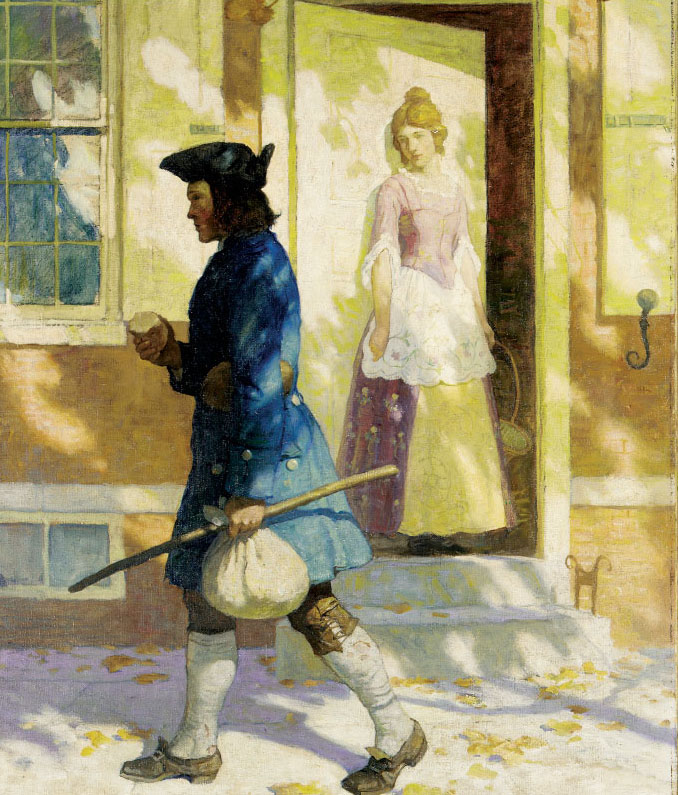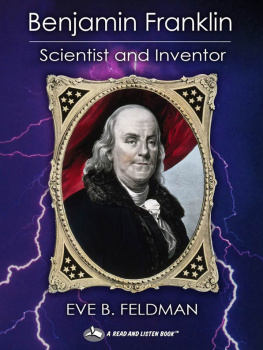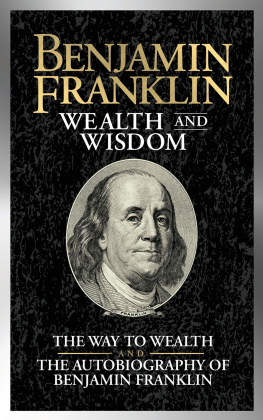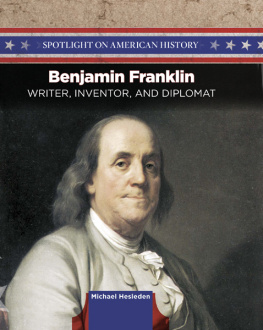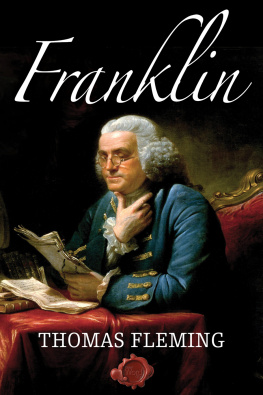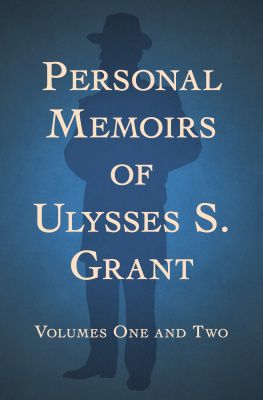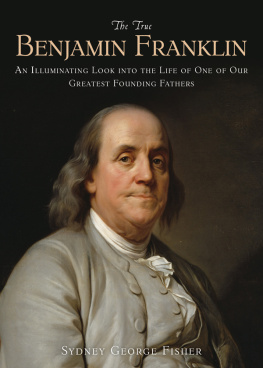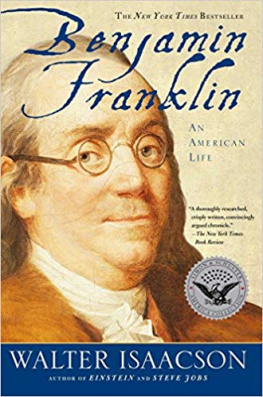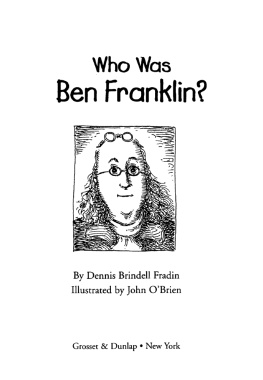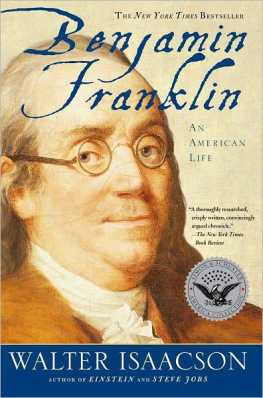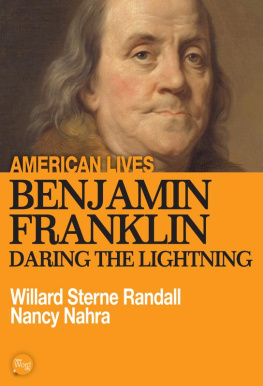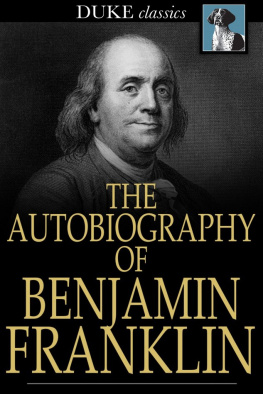CONTENTS
- Chapter One
FRANKLIN THE SCIENTIST - Chapter Two
ELECTRICITY - Chapter Three
POSITIVE AND NEGATIVE - Chapter Four
THE KITE - Chapter Five
THE LIGHTNING ROD - Chapter Six
FRANKLIN THE INVENTOR - Chapter Seven
OTHER INVENTIONS AND FIRSTS - Chapter Eight
EXPERIMENTS YOU CAN DO WITH STATIC ELECTRICITY
Guide
BENJAMIN FRANKLIN
The author would like to acknowledge Roy Goodman of the American Philosophical Society.
From About.com
http://inventors.about.com/od/fstartinventors/ss/Franklin_invent.htm
From the Franklin Institute
http://fi.edu/franklin/inventor/inventor.html
From ushistory.org
www.ushistory.org/franklin/info/inventions.htm
From Social Studies for Kids
www.socialstudiesforkids.com/articles/ushistory/benjaminfranklininventions.htm
From Libertys Kids
www.libertyskids.com/arch_who_bfranklin.html
From PBS
www.pbs.org/benfranklin/l3_inquiring_little.html
From Local Government Exhibits
www.loc.gov/exhibits/treasures/franklin-scientist.html
From Thinkquest
http://library.thinkquest.org/22254/inventions.htm
From MIT
http://web.mit.edu/invent/iow/franklin.html
Images of Inventions
www.google.com/search?q=ben+franklin+inventions+for+kids&client=safari&sa=X&rls=en&tbm=isch&tbo=u&source=univ&ei=mubvUoHmOInNsQSs_oCICw&ved=0CEkQsAQ&biw=1280&bih=607
From Benjamin Franklin houseplace to visit for students
www.benjaminfranklinhouse.org/site/sections/education/
Adler, David A. B. Franklin, Printer. New York: Scholastic, 2001.
Aliki. The Many Lives of Benjamin Franklin. New York: Simon & Schuster, 1988.
Barretta, Gene. Now and Ben: The Modern Inventions of Benjamin Franklin. New York: Square Fish, 2008.
Byrd, Robert. Electric Ben: The Amazing Life and Times of Benjamin Franklin. New York: Dial, 2012
Cousins, Margaret. Benjamin Franklin of Old Philadelphia. New York: Random House, 1963.
Franklin, Benjamin. Essays, Articles, Bagatelles, and Letters, Poor Richards Almanack, Autobiography. New York: Library of America, 1987 (with notes from J. A. Lemay).
Franklin Institute. The Ben Franklin Book of Easy and Incredible Experiments: A Franklin Institute Science Museum Book. New Jersey: Wiley, 1995.
Freedman, Russell. Becoming Ben Franklin: How a Candle-Makers Son Helped Light the Flame of Liberty. New York: Holiday House, 2013.
Fritz, Jean. Whats the Big Idea, Ben Franklin? New York: Putnam, 1982.
Graf, Rudolph F. Safe and Simple Electrical Experiments. New York: Dover Publications, 1973.
Miller, Brandon Marie. Benjamin Franklin, American Genius: His Life and Ideas with 21 Activities (For Kids series) Chicago: Chicago, 2009. (grades 712)
Van Vleet, Carmella. Amazing Ben Franklin Inventions You Can Build Yourself. Vermont: Nomad Press, 2007.
Benjamin Franklin never watched television. He never listened to the radio, saw a movie, or played computer games. He never even turned on a light switch. When Benjamin Franklin lived, more than two hundred years ago, none of these things existed. Thats because televisions, lights, radios, and computers are all powered by electricity. And in Franklins time, no one knew very much about electricity: what it was, where it came from, or how to use it. In fact, it was Benjamin Franklins curiosity that made him study and experiment with electricity.
In 1706 when Benjamin Franklin was born, people used candles to provide light. This was good for Benjamins father, Josiah Franklin. He was a candle and soap maker in Boston.
Even though people needed candles, Benjamins father was not a rich man. He had a large family to support. Benjamin, his youngest son, was the fifteenth of seventeen children. The Franklins couldnt afford to give Ben more than two years of school, so Ben only went to school between the ages of eight and ten. His teachers probably didnt expect him to become famous. Its likely that they just hoped hed finally understand arithmetic, in which he did very poorly.
But Benjamin Franklin was a scientist, even as a young boy. He was always trying to find out why things were the way they were. And he was always trying to make things better.
As a boy, Ben experimented with all kinds of tricks to improve his swimming. Once he held on to a kite while floating, and let the kite pull him across the water. He also made himself wooden paddles to see if they would make him a better swimmer. The paddles for his hands, called pallettes, had a place for his thumbs. The paddles on his feet were sandal-like flippers. Ben decided that the paddles were too heavy to help him swim.
Of course, no one knew Ben was a scientist then. They just thought he was full of curiosity. It was curiosity that made Benjamin Franklin an avid reader. He wanted to know everything about everything, and he thought that the best way to do that was to read books. Ben said he couldnt remember a time when he wasnt reading. And he kept on reading, even after he had to leave school and go to work.
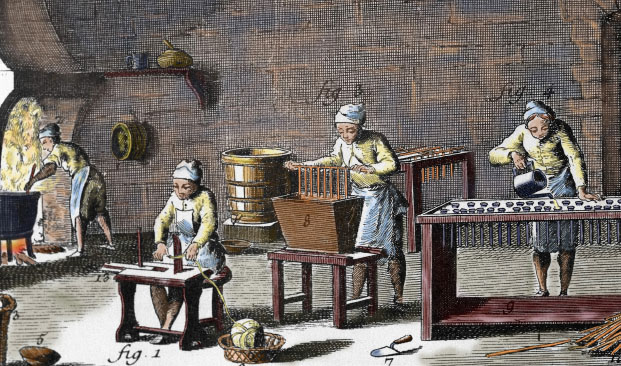

Although Ben disliked the work in his fathers candle shop, he stayed with it for two years. Later in life he said that this work taught him how to handle tools.
In those days, children started working at an early age. They learned a profession by working for someone whose trade they wanted to master. Because Ben was so fond of books and reading, it was decided that he would learn to be a printer. He would be an apprentice, a kind of student-worker, for his older brother James.
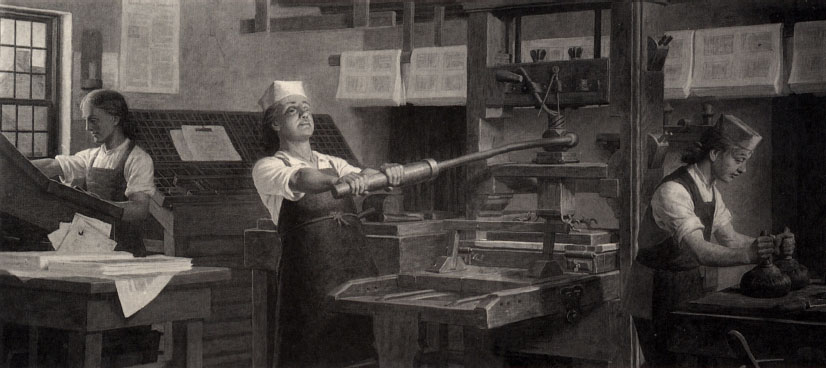

Ben Franklin worked hard in Boston, learning how to operate the printing presses andhow to sell theresults.
Ben was a hard worker and he learned fast. He used his lunch time to read and teach himself as much as possible. He taught himself math. He even experimented on improving his writing.
By the time he was seventeen, Ben Franklin felt hed learned quite a bit about printing. He wasnt getting along with his brother as his boss, so he left Boston and made his way to Philadelphia. He had barely any money, but he knew his trade. He found work as a printers assistant and after several years of hard work, he opened up his own printing shop.
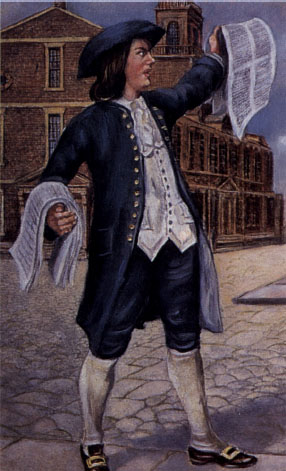

Before long, Ben combined his printers trade with his writing talents. He bought a newspaper called the Pennsylvania Gazette.
